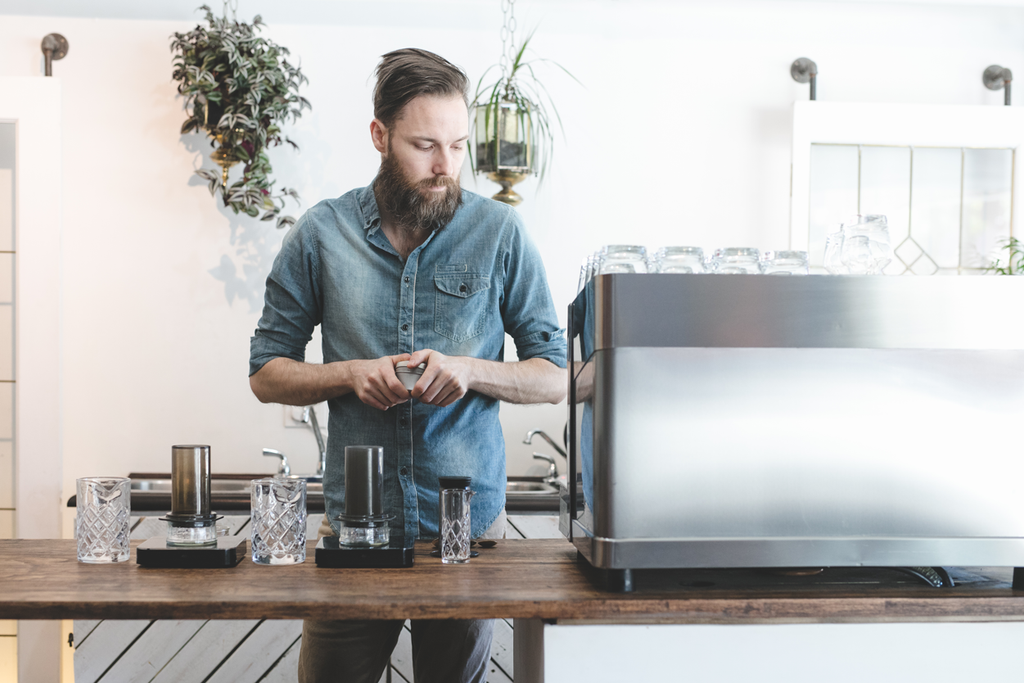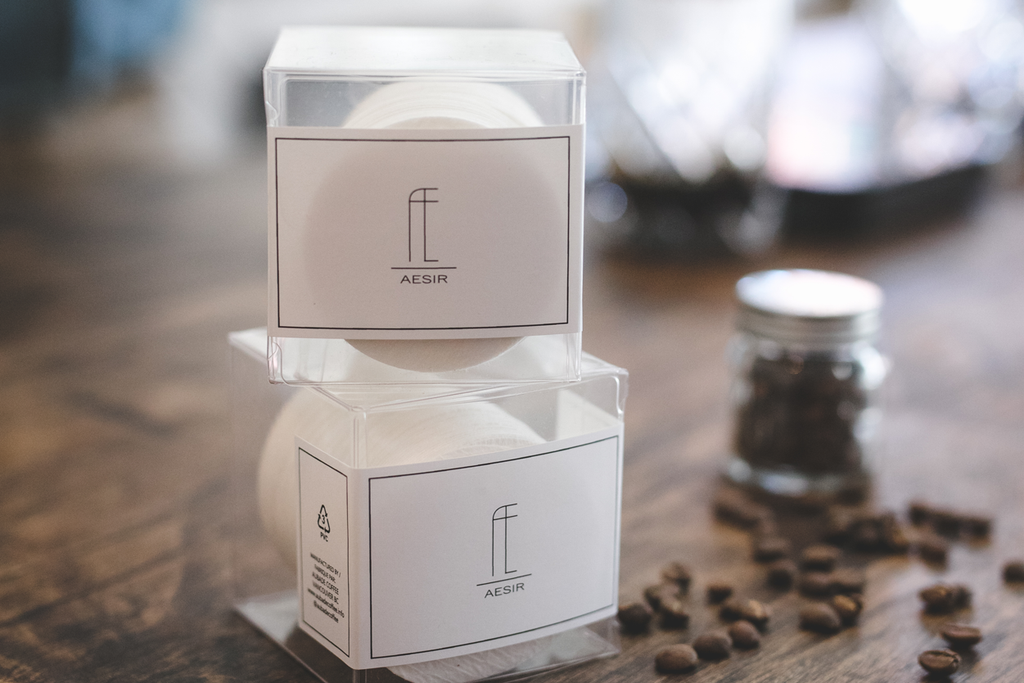Q&A with Eldric Stuart of Aesir Filters

Q&A with Eldric Stuart of Aesir Filters
Eldric Stuart is the owner of Aubade Coffee in Vancouver and recently developed his own coffee filters! We chatted with Eldric about his coffee shop Aubade Coffee, his Aesir filters, and tips for AeroPress brewers.
How did preparing for the 2016 AeroPress competition take you down the pathway to developing your own filters?
I made a personal challenge to brew 1 AeroPress a day; it usually just sat on my shelf except when the competitions came in. I always felt, like many other people, it was a great travel brewer, it was pretty convenient and easy to clean, but didn’t quite make as clean of a coffee as a V60 or a Chemex. The generally held belief was that it maybe provided more body, but a generally murkier and not quite as crisp and clean cup. And even visually you can see it’s a cloudier coffee.
So I just started experimenting with different variables, and like a lot of other people, I knew that the paper filter, the type of filter had a really big impact on the coffee. You look at the difference between Chemex and V60 – the cone is very different shape, but ultimately, a lot of it came down to the paper.
I would cut up a Chemex paper, or a V60 and Kalita filter and tried those – I tried 2 versus 3. I noticed some subtle differences, but nothing that big.
So I started thinking outside the box, which is what I generally do, I’ve never been a fan of the status quo – I’m always challenging and trying new things without anyone’s’ permission.
I’ve never been a fan of the status quo – I’m always challenging and trying new things without anyone’s’ permission.
I started looking at paper from different industries. You start off looking at paper from art companies; I found some pulp manufacturers that do paper filters from a wide variety of different industries - from face masks for painting, to air filters of cars and houses to laboratory grade paper filters. I spent hundreds of dollars bringing all these samples in and testing them out and found one that had the exact right qualities that I was looking for. I wanted it to still be a smaller pore size, cleaner taste and wanted it to be more consistently manufactured.
So I did some testing, and this was the week of the competition, I tried a bunch and they weren’t really doing what I wanted, so I tried one more different pore size. It was 4 days before the competition but I really enjoyed it. Cut a bunch up, went to Calgary to compete and nearly won! Made it to the final four but Jill Hoff beat me in the semi-finals and she won the competition. It was pretty close… a 2 to 1 decision.
I felt like I was really onto something. Then spent the next 9-10 months developing, branding and sourcing.
And now, you’ve created the AESIR filters! What response have you gotten to your filters?
I’ve gotten some really amazing feedback from some amazing people. I had Nick Hatch who was the first ever Canadian AeroPress champion - he also finished 2nd in the world - he told me he doesn’t even use his V60 anymore and he threw out all of his other filters.
I had Javaid Shah who won the Canadian Brewers Cup using AeroPress and my filters – he beat me in competition using my own filters. So that was the caveat for me not winning was at least someone won using my filters.
The people that are using them are really enjoying the flavours – just getting so much more of the coffees natural characteristics and so much juiciness coming through.
I notice in your coffee shop you only offer manual brewing methods. Why do you like manual brewing and brewing with an AeroPress?

As far as manual brewing goes, A) I have a love for making things with my own hands. It’s a very therapeutic process and you get a much more intimate connection with coffee.
B) I’ve never really been a big fan of batch brew – part of that might stem from being in Melbourne, when I was learning specialty coffee, batch brew really wasn’t a thing. It’s mostly just because I’m not a big believer in the process of batch brew - I think potentially you could improve the technology, but you just get really uneven extraction because of the way the brewing mechanism works and I’ve just always been able to make a better coffee with a pourover.
As far as AeroPress goes, I like brewing it at home and using it in competitions, but I never thought I would use it in my coffee shop because it’s not as elegant. There are plastic pieces everywhere and it’s a bit more time consuming because you can only do one at a time, but the bottom line is that I’ve just always now been able to make better tasting coffee on AeroPress than I can on any other brew method - especially using my filters.
The old belief that the AeroPress is not as clean tasting as a v60, the filters that I made, eliminate that. You essentially can make a coffee at the same quality as a V60 on an AeroPress but you also get the added customization of the brewer, so you really control the variables and really play with your recipe - it just adds that much more over a V60. I’m a firm believer that the AeroPress with my Aesir filters are just the best brew method you can use.
Coffee is the complex thing that we know so little about, there’s so much that is happening at the farming level, and from a scientific perspective that we’re still really just understanding.
Do you have any brew tips for brewers looking to step up their game?
We do a pretty complicated process even in my shop on a day to day basis, I do a 3 part extraction process where I’m isolating different acid compounds and then adding them back in so I can control the amount of fruit acids and tone down the bitterness.
I’ve done a collaboration with Erich who does the testing at Eight Ounce Coffee and he’s got a blog called MNML coffee and he does a bunch of brew guides and he did one based on one of my simplified AeroPress recipes.
Simple is often best, but you just have to understand the factors that cause extraction. I am a big fan of Nick Hatch, he’s a home brewer and he’s never worked in a coffee shop before, and he was 2nd in the world; his recipe is really quite simple and he does something that I’m a big advocate for.
The AeroPress has a design feature where it has little slits around the cap and those exist to make sure there isn’t too much of a pressure build-up in the AeroPress otherwise the plastic would warp. If you press too hard and too fast, it actually forces things to go around the filter through those slits so the filter no longer does its job. I’m a big believer in going nice and slow.
At least for anyone in Vancouver, I do regular workshops, just to teach people how to use them.
Clearly, you put a tonne of effort into coffee, with your coffee shop, competing and now creating your own filters. Where does that passion stem from? Why do you love coffee so much?
I drink a lot of tea at home, but it doesn’t have the same challenge as coffee does. I find tea a bit too easy, you know you get your right brew temperature, the right amount of water, boom – you’re done. It’s all about the sourcing of the tea.
Coffee is the complex thing that we know so little about, there’s so much that is happening at the farming level, and from a scientific perspective that we’re still really just understanding.

I enjoy making coffee and interacting with customers. I like that working in a coffee shop it’s one of the few jobs where you get customers coming up to you, being like ‘that was really awesome, thank you so much’. Very rarely you have a job where you get that kind of feedback from a customer where they really appreciate what you do – usually, you only hear the bad stuff.
I remember one specific coffee when I was working in Melbourne, I was working for St Ali Coffee Roasters, I was doing some training and this gentleman, named Lockland Ward, he brewed up a siphon coffee for us and didn’t really tell us anything about it.
I took a sip and it just blew my mind – it was unlike anything I have ever had before, it was like strawberries and cream. It turned out it was Finca Esmeralda Geisha, just casually, which would have been $150 a bag. That was the one coffee that I compared all other coffees to. I was just at that point, really hooked.
How could I take something that generally, my experience most of my life, was pretty awful tasting and how could I take it to that level? So I kind of became obsessed with chasing coffee to that quality and really wanting to understand it.







